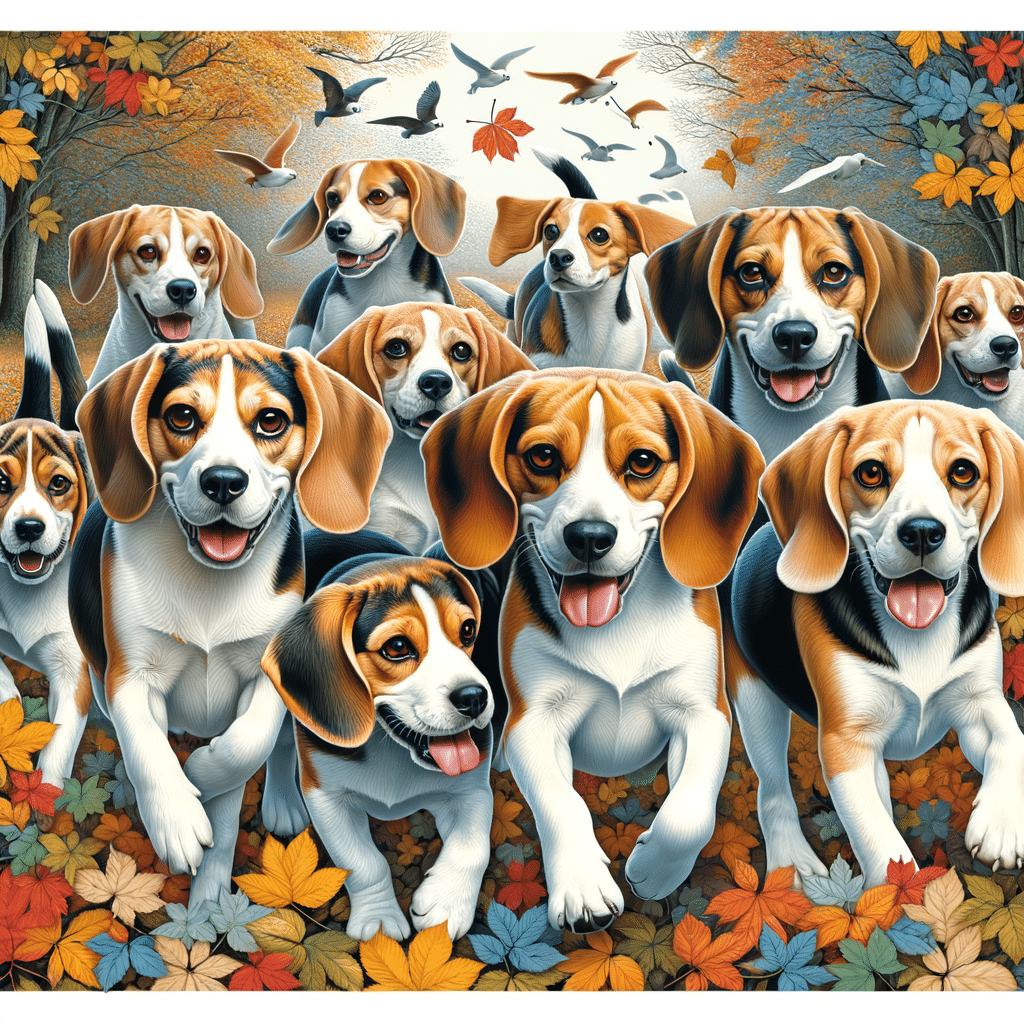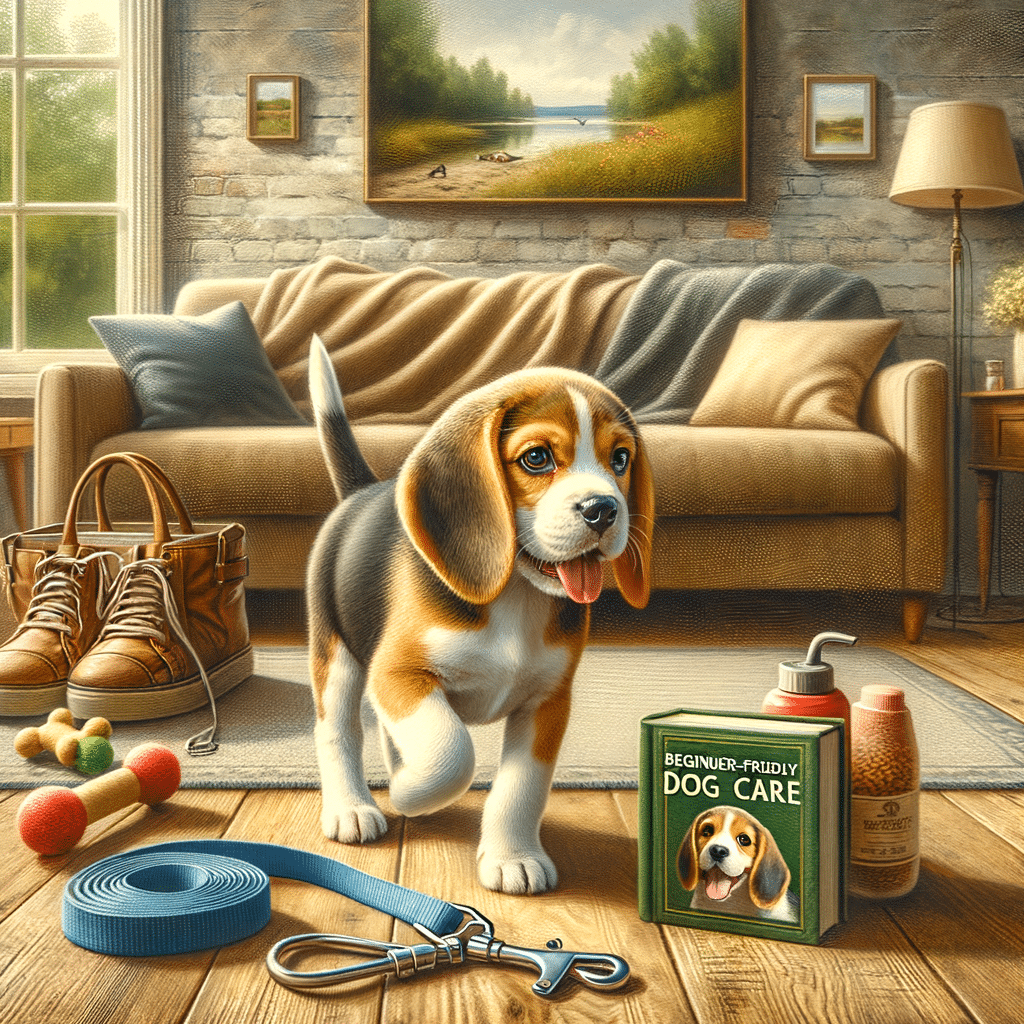With their compact size and endearing expressions, beagles are a dog breed that often comes up in discussions about family pets. Known for their friendly and sociable personality traits, these dogs have a reputation for being great companions for children and adults alike. Their size and temperament make them great for family life, and possess traits that align well with an active household setting.
In This Article
While beagles are affectionate and gentle with family members, they also bring traits from their hunting heritage. This means they can be curious and follow their noses, sometimes leading to mischief. For families considering a beagle, understanding how to manage their energy and provide sufficient exercise and mental stimulation is crucial to successfully integrating them ly.
Highlights
- Beagles are considered friendly and sociable, making them suitable for family life.
- These dogs require active engagement and consistent training due to their hunting instincts.
- Given their strong sense of smell, a beagle may need a secure environment to prevent wandering.
Beagle Characteristics
Beagles are renowned for their friendly disposition and moderate size, contributing to their reputation as agreeable family pets. Their sturdy build and friendly temperament make them suitable for various living environments.
Temperament and Behavior
Beagles are social and affectionate dogs that are often friendly and playful. They thrive on companionship with humans or other dogs and are frequently considered excellent companions for young children.
Due to their hound heritage, beagles can exhibit independent behavior and a stubborn streak. Still, with consistent training, they generally become well-mannered pets. Their drive for mental stimulation and exercise makes them highly demanding; hence, activities and games can be vital to their well-being.
Physical Attributes
As a small to medium-sized breed, beagles typically stand between 13 and 15 inches at the shoulder and possess a sturdy, compact frame. Recognizable by their soft, floppy ears and expressive faces, beagles have short, relatively low-maintenance coats in various colors. While they do shed, regular grooming can help keep shedding under control.
Health and Lifespan
Regarding health, beagles are a generally healthy breed with a life expectancy of 10 to 15 years. However, like all breeds, they can be prone to specific health problems, including epilepsy, hypothyroidism, and, in some cases, cancer. Awareness and proactive health management are imperative for maintaining their vitality over the years.
Care Requirements
Beagles require regular exercise to satisfy their high energy levels and to prevent boredom. They benefit from daily walks, play sessions, and exploring safely fenced areas. As for grooming, they are considered easy to groom. Regular brushing, occasional baths, and routine checks of their ears and nails keep beagles in good condition. Consistent dog training for your beagle puppy also helps manage their sometimes independent nature, ensuring they remain well-behaved family members.
Beagles with Families
Beagles are known for their friendly and happy-go-lucky nature, which makes them a sought-after choice as a family dog. Carefully bred traits such as kindness and patience make them excellent with children and adults alike.
Interaction with Children
Beagles are gentle around children, often displaying patience and a kind disposition. Their medium size and robust build make them suitable playmates for kids. Importantly, nurturing from an early age ensures they cuddle and interact safely, fostering a bond of mutual respect and affection.
Beagles in Home Environments
Regarding adaptability, beagles can thrive in various home environments, including apartment living. Due to their energetic nature, they require adequate exercise and mental stimulation. Their friendly attitude means they often integrate well as part of a family unit, sometimes even getting along with other pets when properly socialized.
Training and Socialization
Training a beagle requires consistency as they can be easily distracted by their strong sense of smell and instinct to follow scents. However, they are typically easy to train with positive reinforcement techniques. Early socialization and obedience training are crucial, particularly in teaching proper leash behavior. This ensures they become well-mannered family dogs that can safely interact with both people and other animals.
Common Considerations
When evaluating beagles as family dogs, potential owners should consider their behavioral traits and how to manage separation anxiety, which can significantly influence the family’s and dog’s quality of life.
Behavioral Traits
Beagles are known for their affectionate and lively nature, often proving to be loyal companions to their pet owners. They have a friendly disposition, ideal for families with children. However, their mischievous streak may require consistent training and attention. Beagles can be loud, given their inherent barking tendencies, which can serve as a practical watchdog function but may also lead to excessive barking if not correctly managed.
- Pros: Loyal, affectionate, good with children, friendly.
- Cons: Can be mischievous, prone to barking, may tend to dig.
Managing Separation Anxiety
Separation anxiety is a common issue in beagles, stemming from their pack-dog heritage. They may exhibit signs of anxiety when left alone, which can result in undesirable behaviors such as chewing or howling. Consistent training and establishing a routine can mitigate separation anxiety. Mental stimulation and physical exercise can also help reduce anxiety levels in beagles.
Strategies for anxiety reduction include:
- Consistent training and routine
- Mental stimulation (e.g., puzzle toys)
- Regular exercise (e.g., walks, playtime)
Frequently Asked Questions
When considering a beagle as a family pet, it is important to understand the breed’s temperament and care needs. Below are frequently asked questions that address common concerns and characteristics relevant to families.
What are the typical traits of beagle temperament that affect their compatibility with families?
Beagles possess a friendly and playful temperament. They tend to be affectionate and gentle, which can harmonize well with a family dynamic.
How do beagles generally behave around children?
Beagles are known for being one of the best dog breeds for children due to their docile and friendly nature, which allows them to interact well with kids.
Can beagles coexist peacefully with other household pets, such as cats?
Beagles can coexist with other pets, including cats, especially when socialized from an early age. However, their hunting instincts may require careful introduction and supervision.
What are some pros and cons of bringing a beagle into a family setting?
Some pros include a beagle’s adaptability and friendly nature. Cons may involve their tendency to be vocal and their need for frequent activity to prevent boredom.
Do beagles require a lot of maintenance compared to other dog breeds?
Beagles are generally hardy dogs that thrive with regular exercise and basic care. They do not require excessive maintenance but do need consistent grooming and medical attention.
What are common challenges faced by families who own beagles?
Challenges may include managing their vocalizations, which can be problematic with young children, and providing them with enough physical and mental stimulation.






